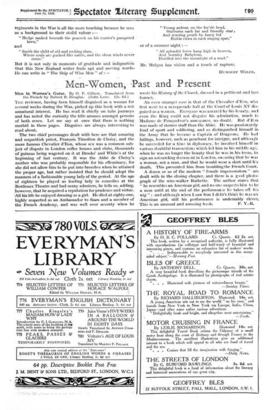Men-Women, Past and Present Men in Women's Guise. By 0.
P. Gilbert. Translated from the French by Robert B. Douglas. (John Lane. 12s. t3d.) THE reviewer, having been himself disguised as a woman for several weeks during the War, picked up this book with a not unnatural interest. He has read it chiefly on tube journeys and has noted the curiosity the title arouses amongst persons of both sexes. Let me say at once that there is nothing morbid in these pages. Disguises are always interesting to read about.
The two chief personages dealt with here are that amazing and coquettish priest, Francois Timoleon de Choisy, and the more famous Chevalier d'Eon, whose sex was a common sub- ject of dispute in London coffee houses and clubs, thousands of guineas being wagered on it at Brooks' and White's at the beginning of last century. It was the Abbe de Choisy's mother who was probably responsible for his effeminacy, for she did not allow him to be put into breeches when he attained the proper age, but rather insisted that he should adopt the manners of a fashionable young lady of the period. At the age of eighteen he played as leading lady in comedies at the Bordeaux Theatre and had many admirers, he tells us, adding, however, that he acquired a reputation for prudence and virtue, AlI his life he enjoyed dressing as a girl. He died at eighty-one, highly respected as an Ambassador to Siam and a member of the French Academy, and was well over seventy when he wrote his History of the Church, dressed in a petticoat and lace bonnet.
An even stranger case is that of the Chevalier d'Eon, who first went to a masquerade ball at the Courtof Louis XV dis- guised as a woman. Everyone was amazed by his beauty, and even the King could not disguise his admiration, much to Madame de Pompadour's annoyance, no doubt. But d'Eon was made of sterner stuff than the Abbe. He was passionately fond of sport and soldiering, and so distinguished himself in the Army that he became a Captain of Dragoons. He had failings, however, such as penchant for intrigue, and although he succeeded for a time in diplomacy, he involved himself in' various doubtful transaction which led him in his middle age, when he was no longer the beauty that he was in his teens, to sign an astounding document in Lonion, swoaring that he was a woman, not a man, and that he would wear a skirt until h's death. This prevented him from troubling the French Court.
A dozen or so of the modern "female impersonators" are dealt with in the closing chapter, and there is a pod photo- graph of the wire-walker Barbette. The author states that "he resembles an American girl, and no one suspects him to be a man until at the end of the performance he takes off his wig " : and although when I saw him I diin't think he was an American girl, still his performance is undeniably clever, This is an unusual and amusing book. F. Y.-B.






















































 Previous page
Previous page